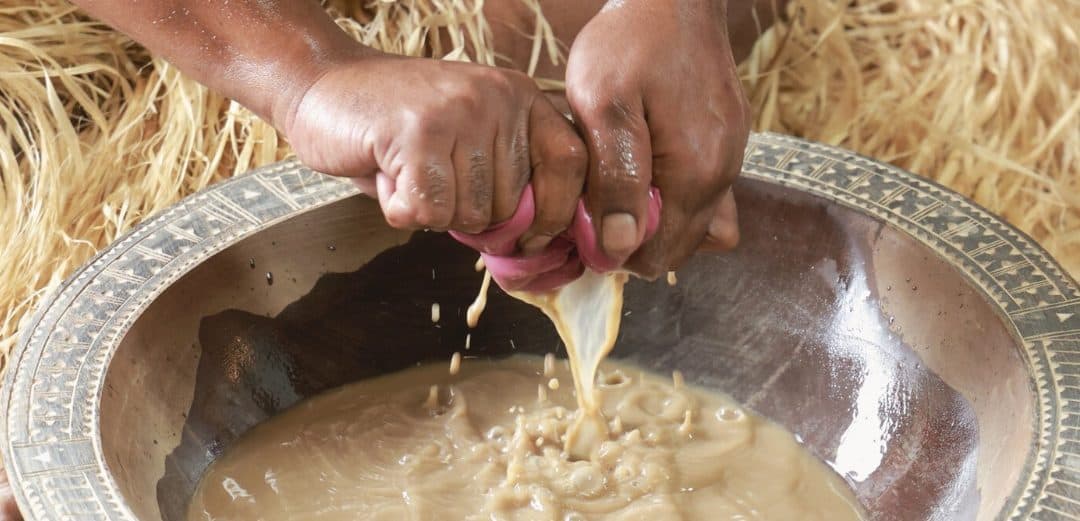A Papua New Guinea kava supplier is lobbying for Fiji’s government to change its kava import laws.
Ocean Kava Limited managing director Bilaki Enape Waizepa said currently PNG can only send roots to Fiji, but not the finished product.
A Biosecurity Authority of Fiji spokesperson confirmed to RNZ Pacific that at the moment just whole roots or chips can be imported with an import permit, but powder cannot.
This is a problem for Waizepa, whose main export market is Fiji.
“I [have] got a lot [of kava to] supply, and Fiji biosecurity does allow us to supply only the roots, not in a powder form,” Waizepa said.
“I do have machines at home…but the capacity is small because we have tonnes and tonnes to make into powder, we need proper machines.”
Both New Zealand and the United States allow powder imports.
He said Germany and China have just opened up for kava.
But for now, PNG cannot feed those markets, he said, adding “capacity” building was needed in PNG first and that is where the Fiji market comes in.
“Then we can look outside,” he added.
Earlier this year, Pacific kava producing countries agreed on the Implementation Plan for the Regional Kava Development Strategy (RKDS) in their efforts to protect kava.
The regional kava strategy was launched at the 53rd Pacific Islands Forum leaders meeting in Tonga in August.
Tonga’s Minister for Trade, Dr Viliami Uasike Latu, said the strategy was “a collective vision, a roadmap that reflects our shared commitment to harnessing the full potential of kava.”
“Kava is more than just a plant – it is the lifeblood of many Pacific Island cultures, a symbol of unity, peace, heritage, and tradition,” Tonga’s Princess Angelika Lātūfuipeka Tuku’aho said.
Kava is an important commodity with rich cultural, social, and economic significance across the region and considered the ‘green gold’.
PNG has high hopes for its budding kava industry, with International Trade and Investment Minister, Richard Maru, suggesting the country had the “potential to become the biggest producer of kava in the world” at the 14th World Indigenous Business Forum held in Port Moresby last year.
Waizepa said what sets PNG kava apart is the high kavalactones.
“The higher the kavalactones inside, the stronger it is. Therefore, PNG kava has the highest in the whole of the Pacific,” he said.
A University of the South Pacific (USP) report explains that the active ingredients of kava are called kavalactones. There are 15 kavalactones found in kava, each having a different physiological effect.
“PNG’s from 14-17, Vanuatu’s from 12-13 and Fiji’s around 10,” he said.
Waizepa hopes kava production will help reduce high unemployment rates in remote communities.
“People are really looking for means and ways to earn money for survival, and especially our unemployed bulk of our unemployed population,” Waizepa said.
He said unlike Vanuatu and Fiji, which have well established kava markets, PNG is still young.
“Fiji is a small island, Vanuatu is small, they cannot feed the whole demand. PNG has to come in,” Waizepa said.
He sees big potential for industry growth with people in remote villages in Madang already benefiting.
“The farmers there are from the interior part of Madang, not from the town area or the developed area.
“Their chances of any money is very limited, but when kava goes in, they are getting a lot of money, and it is helping the families to buy school fees for the children, buy their clothes.”
For much of PNG, kava is not a cultural drink. However, in Madang it is.
“So, we told them, you can go into commercial cropping and now they are really into mass farming.”
Waizepa said unlike coffee, cacao and other crops, which need a lot of labour, the effort to plant kava is less and it takes only three years for the crop to mature. His company alone is exporting 40-tonnes annually with capacity to increase.
